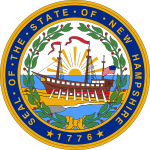
Back ھەڵبژاردنی سەرەتاییی سەرۆکایەتیی نیوھەمپشیر CKB Primarias de New Hampshire Spanish Primaire du New Hampshire French הבחירות המקדימות בניו המפשייר HE Primary van New Hampshire Dutch
| Elections in New Hampshire |
|---|
 |



The New Hampshire presidential primary is the first in a series of nationwide party primary elections and the second party contest, the first being the Iowa caucuses, held in the United States every four years as part of the process of choosing the delegates to the Democratic and Republican national conventions which choose the party nominees for the presidential elections to be held in November. Although only a few delegates are chosen in the New Hampshire primary, its real importance comes from the massive media coverage it receives, along with the first caucus in Iowa.
Spurred by the events of the 1968 election, reforms that began with the 1972 election elevated the two states' importance to the overall election,[1] and began to receive as much media attention as all of the other state contests combined.[2] An upset victory by an underdog candidate, or a weak showing by a front-runner can change the course of the primaries, as happened in 1952, 1968, and 2008 for the Democrats, and in 1980 for the Republicans.
Since 1952, the primary has been a major testing ground for candidates for both the Republican and Democratic nominations. Candidates who do poorly frequently drop out, while lesser-known, underfunded candidates who excel in New Hampshire can become serious contenders, garnering large amounts of media attention and campaign funding.
The New Hampshire primary is a semi-open primary: unaffiliated voters (those registered without party affiliation) may vote in either party's primary. Voters registered with one party cannot "cross vote" to vote in another party's primary.
- ^ "Nominations & Conventions: Current Practices: Iowa and New Hampshire". U.S. Political Conventions & Campaigns. Northeastern University. Retrieved February 2, 2016.
- ^ Richard M. Perloff, Political Communication: Politics, Press, and Public in America (1998) p. 294